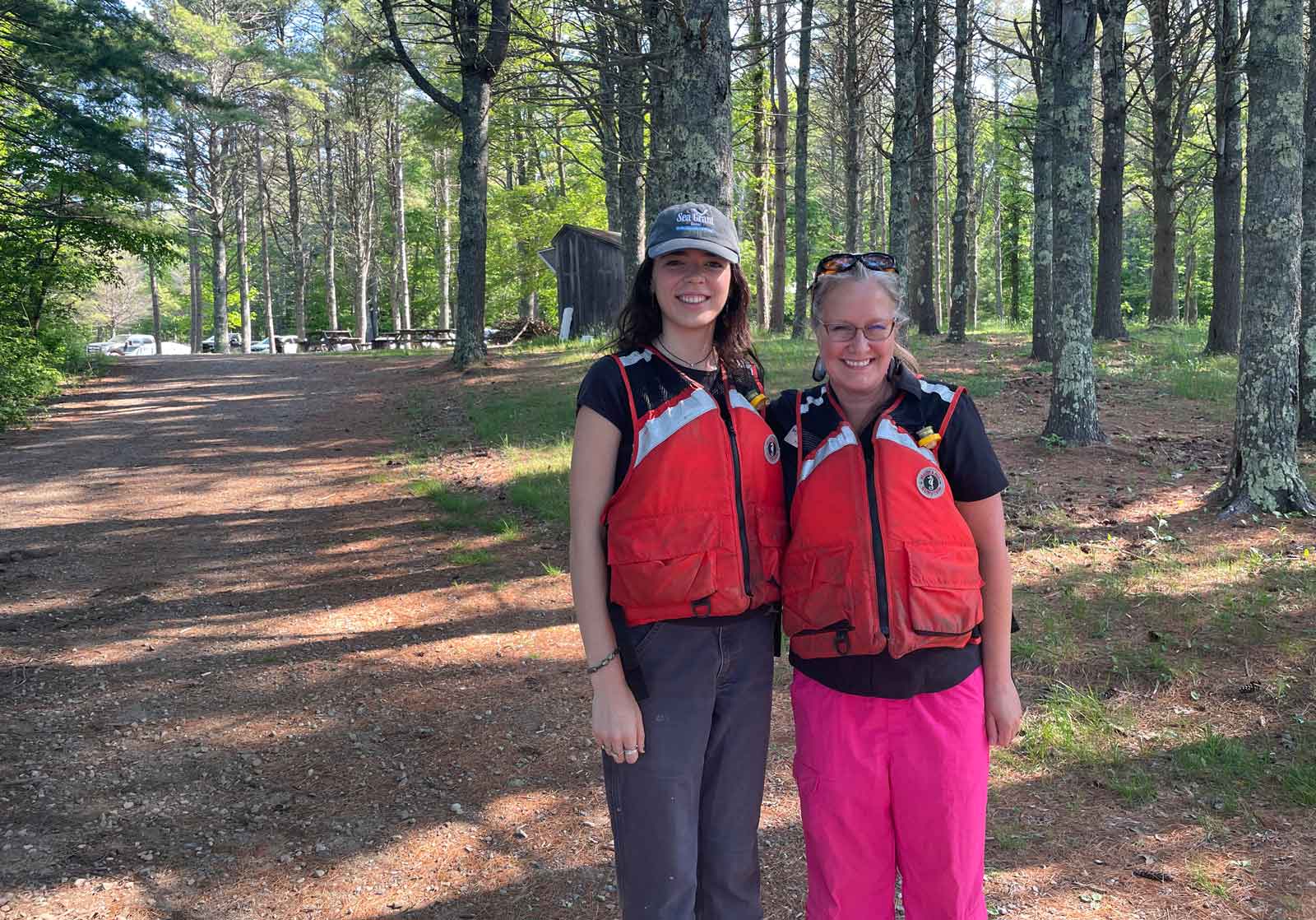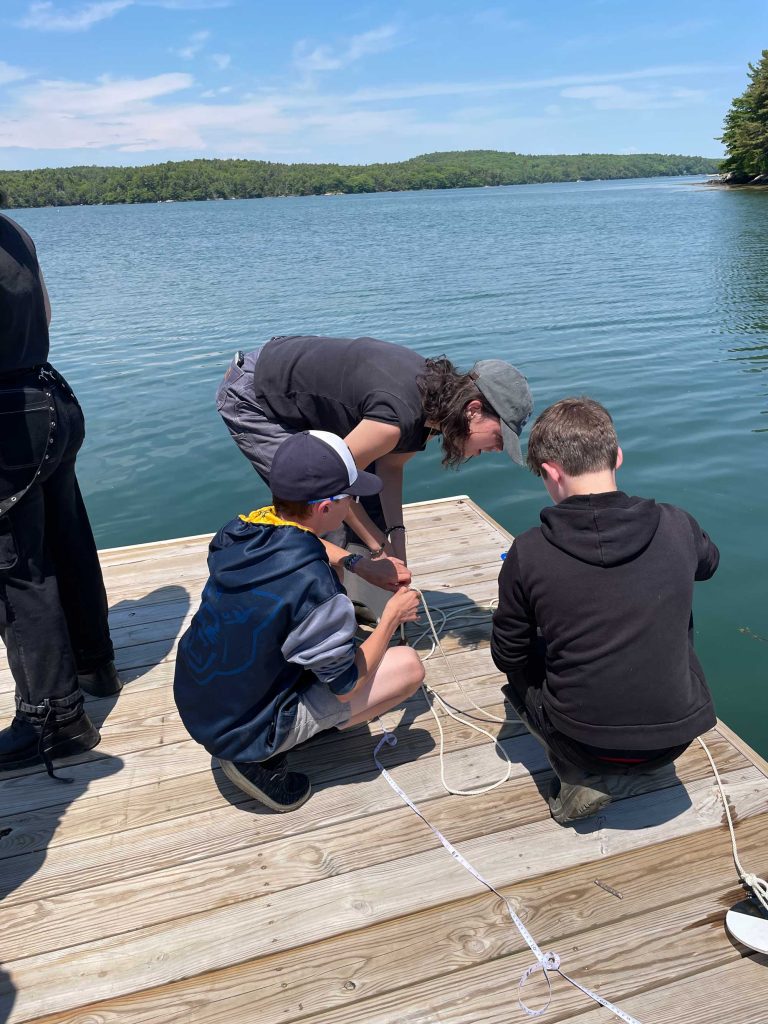
Maine Sea Grant Learning Landscapes Internship – Summer 2024
Contributor: Tori Harris, University of Vermont undergraduate student and Maine Sea Grant Learning Landscapes Intern supported by the National Sea Grant Community Engaged Internship Program.
During the Summer of 2024, I was the Maine Sea Grant Learning Landscapes Intern, a program supported by the National Sea Grant Network’s Community Engaged Internship for Undergraduates. This internship was a great opportunity for me as I transitioned to my senior year as a student at the University of Vermont pursuing a major in environmental studies in the Rubenstein School of Environment and Natural Resources, and a minor in global studies. I am very passionate about environmental justice, reducing waste on our planet, indigenous knowledge, and conserving the amazing natural world that we are a part of.
Growing up in the small town of Damariscotta, Maine, I always loved the different ecosystems and landscapes that we have in my home state. I knew I wanted to pursue a job within the environmental realm, so when I got the opportunity to work with Maine Sea Grant and their many incredible partners, I was ecstatic! The Community Engaged Internship (CEI) team held weekly meetings that offered me opportunities to connect with CEI interns across the Sea Grant Network and with professionals in various environmental fields. Alongside interns from around the country, I was able to experience different environmental projects, learn about job opportunities, and participate in the end of year showcase that really allowed everyone to see the impactful work that had been completed over the summer.
While working with Maine Sea Grant, I was able to help expand their Signs of the Seasons program, a community science initiative that trains individuals to observe phenology, or seasonal changes, of common plants and animals in their backyards and communities. The goals of the program are to increase climate literacy while filling data gaps in our understanding of the local effects of climate change, tracked by the USA National Phenology Network.
My primary focus during the internship was on outdoor learning landscapes for K-12 audiences as well as figuring out how we can break the divide between humans and nature. The work strived to ensure accessibility for all schools and teachers, no matter their funding or location, to create easier ways to transition to outdoor classroom spaces. Through this I gained insight into all of the hard work teachers devote towards making their classrooms a safe and helpful environment, and I wanted to reflect this when completing my project.
The focus of my work was on fun, easy, and accessible activities that got students outside and to engage with the local environment. We created a phenology-based nature calendar exercise that allows students to go outside and observe the seasonal changes occurring in plants and animals on their school campus throughout the academic year. This allows students to create a sense of place and connection with a species, “see” and understand their lifecycle, while also considering climate change impacts at a local scale. The activities are suitable for first to eighth grade, with the complexity increasing with the grade level.

During this project I was also able to be creative and bring in my own fun ideas; I chose to make a leaf identification ring to assist students with identifying trees from their leaves. These simple leaf rings were enjoyable to create, and I loved the positive reactions from teachers even more!
During the internship I was able to work with some of Maine Sea Grant’s partners including the Coastal Maine Botanical Gardens (CMBG). Working with CMBG for two weeks was an amazing experience and allowed me to explore multiple job opportunities in plant botany. I shadowed plant scientists, horticulture therapists, horticulturists, and educators at the gardens. I also researched plant and pollinator specialists and found this work to be very interesting and meaningful to our ecosystems.
I also worked closely with Coastal Mountains Land Trust, which allowed me to travel across Maine and talk to teachers who were trying to transition to outdoor classrooms. The land trust advocates for outdoor education and is doing great work with schools in Maine. For example, they conserve land adjacent to schools to enhance outdoor classrooms/learning landscapes, and help teachers implement more outdoor learning. I was assigned to create a portfolio of already established outdoor classrooms so that educators had access to a resource for inspiration and consideration for their own schools. This project lined up perfectly with my phenology activity work, and we were able to present the project to teachers at an outdoor learning education retreat on Beech Hill in August. This was an amazing experience that allowed us to pilot our activities and gain helpful feedback from educators. It also gave me valuable insights into the lives and struggles of teachers who want to transition their students to outdoor education.




Unfortunately, this internship had to come to an end, but hopefully not forever! I am looking forward to using the knowledge I gained over the summer towards my last year of college and future careers. I want to give a special thank you to Maine Sea Grant Environmental Literacy and Workforce Development Program Manager, Keri Kaczor, for being such a supportive and kind internship leader during my time with Maine Sea Grant. I also want to thank Coastal Mountains Land Trust and Coastal Maine Botanical Gardens for providing me with amazing immersive experiences. I learned a lot about Maine native ecosystems and the important work people are doing to protect our beautiful state.
Posted 13 November 2024
